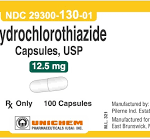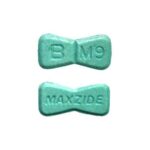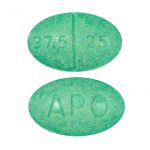What Are The Side Effects Of Stopping Hydrochlorothiazide?

The National Cancer Institute (NCI) defines an adverse effect as “an unexpected medical problem that happens during treatment with a drug or other therapy.” Unwanted effects can result from a physician’s advice and from medications or treatments, including complementary and alternative therapies. They can lead to complications.
Reports from clinical trials describe adverse events (AEs) and serious adverse events (SAEs). SAEs include death, birth defects, complications that require hospitalization, or permanent damage as a result side effects remain one of the major things a patient looks out for in a medication.
What is Hydrochlorothiazide?
Hydrochlorothiazide is a medication used alone or in combination with other medications to treat high blood pressure. Hydrochlorothiazide is used to treat edema (fluid retention; excess fluid held in body tissues) caused by various medical problems, including heart, kidney, and liver disease, and to treat edema caused by using certain medications including estrogen and corticosteroids. Hydrochlorothiazide is in a class of medications called diuretics (‘water pills’). It works by causing the kidneys to get rid of unneeded water and salt from the body into the urine.
Hydrochlorothiazide may also be used to treat patients with diabetes insipidus and to prevent kidney stones in patients with high levels of calcium in their blood. Talk to your doctor about the possible risks of using this medicine for your condition. This medicine is sometimes prescribed for other uses; ask your doctor or pharmacist for more information.
How should Hydrochlorothiazide be used?
Hydrochlorothiazide comes as a tablet, capsule, and solution (liquid) to take by mouth. It usually is taken once or twice a day. When used to treat edema, hydrochlorothiazide may be taken daily or only on certain days of the week. Follow the directions on your prescription label carefully, and ask your doctor or pharmacist to explain any part you do not understand. Take hydrochlorothiazide exactly as directed. Do not take more or less of it or take it more often than prescribed by your doctor.
Hydrochlorothiazide controls high blood pressure but does not cure it. Continue to take hydrochlorothiazide even if you feel well. Do not stop taking hydrochlorothiazide without talking to your doctor.
What happens if I stop taking hydrochlorothiazide?
There are several unwanted effects of stopping hydrochlorothiazide, they include:
- High blood pressure which raises your risk of heart attack or stroke.
- If you stop taking hydrochlorothiazide suddenly, your swelling can increase and your blood pressure might increase rapidly.
- Your swelling and high blood pressure might get worse
While you might have fears and concerns, the long-term health consequences of uncontrolled high blood pressure are often worse than any hydrochlorothiazide side effects. If you have concerns, talk to your doctor or pharmacist. Everyone involved has the same priority — putting your health first.
Treating high blood pressure requires time, patience, and care by both you and your doctor. The important thing is for you to communicate with your doctor and to follow his/her course of treatment.
What are the possible side effects of hydrochlorothiazide?
Get emergency medical help if you have signs of an allergic reaction: hives; difficulty breathing; swelling of your face, lips, tongue, or throat.
Call your doctor at once if you have:
• a light-headed feeling, like you might pass out;
• eye pain, vision problems;
• jaundice (yellowing of the skin or eyes);
• pale skin, easy bruising, unusual bleeding (nose, mouth, vagina, or rectum);
• shortness of breath, wheezing, cough with foamy mucus, chest pain;
• signs of electrolyte imbalance –dry mouth, thirst, drowsiness, lack of energy, restlessness, muscle pain or weakness, fast heart rate, nausea and vomiting, little or no urine; or
• severe skin reaction –fever, sore throat, swelling in your face or tongue, burning in your eyes, skin pain followed by a red or purple skin rash that spreads (especially in the face or upper body) and causes blistering and peeling.
Common side effects may include:
• nausea, vomiting, loss of appetite;
• diarrhea, constipation;
• muscle spasm; or
• dizziness, headache.
This is not a complete list of side effects and others may occur. Call your doctor for medical advice about side effects. You may report side effects to FDA at 1-800-FDA-1088.
What other drugs will affect hydrochlorothiazide?
Taking this medicine with other drugs that make you light-headed can worsen this effect. Ask your doctor before taking a sleeping pill, narcotic pain medicine, muscle relaxer, or medicine for anxiety, depression, or seizures.
Tell your doctor about all your current medicines and any you start or stop using, especially:
• cholestyramine, colestipol;
• insulin or oral diabetes medicine;
• lithium;
• other blood pressure medications;
• steroid medicine; or
• NSAIDs (nonsteroidal anti-inflammatory drugs) –aspirin, ibuprofen (Advil, Motrin), naproxen (Aleve), celecoxib, diclofenac, indomethacin, meloxicam, and others.
This list is not complete. Other drugs may interact with hydrochlorothiazide, including prescription and over-the-counter medicines, vitamins, and herbal products. Not all possible interactions are listed in this medication guide.
Where can I get more information?
Your pharmacist can provide more information about hydrochlorothiazide.





